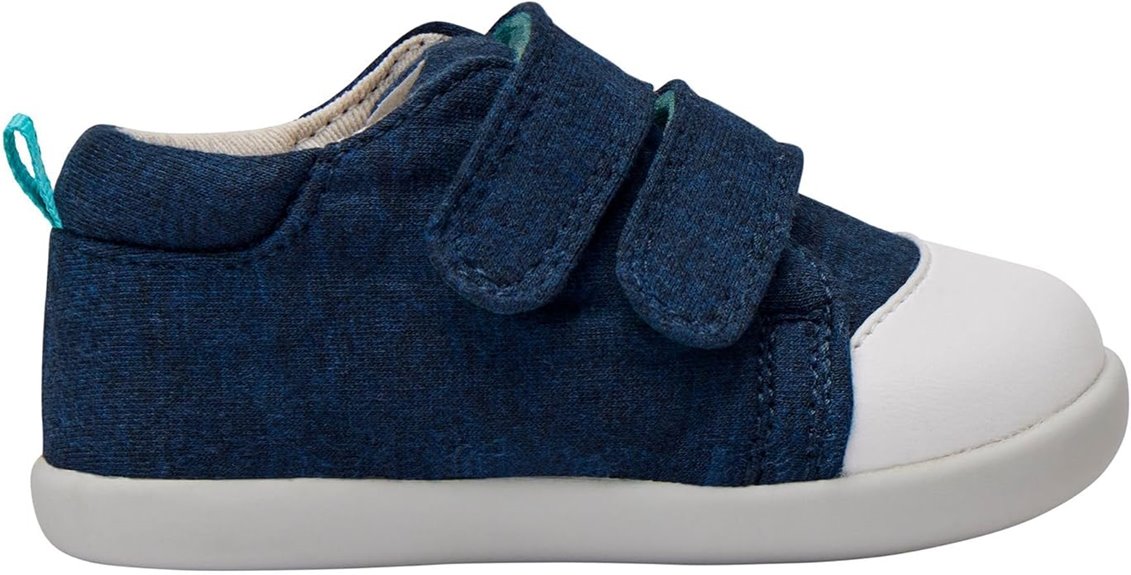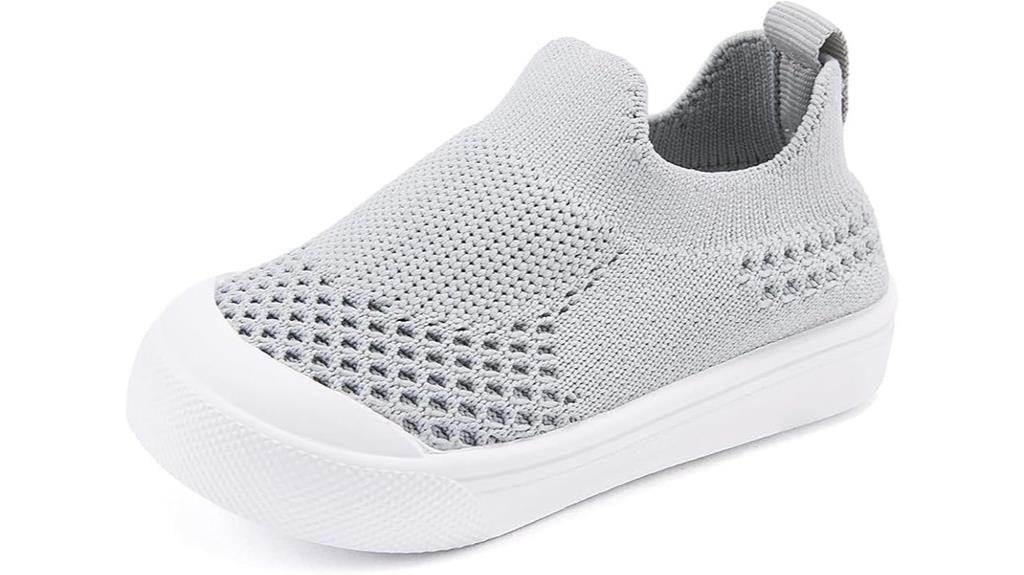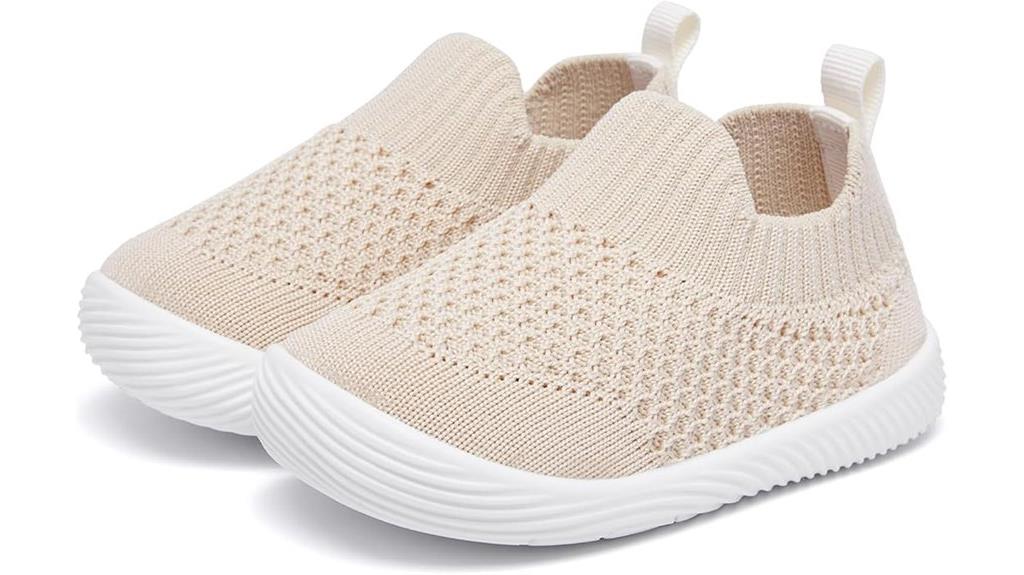You’ll love these top baby shoes that’ll make your little one’s first steps a breeze! Ten Little First Walker Baby Shoes offer lightweight breathability and easy-to-use velcro straps. BMCiTYBM Baby Sneakers provide versatile slip-on comfort for active tots. MORENDL’s Non-Slip Walking Sock Shoes guarantee a secure, cozy fit that grows with your baby. Stick around to uncover the secrets of choosing the perfect footwear for your tiny explorer.
Key Takeaways
- Ten Little First Walker Baby Shoes offer lightweight design with velcro straps, supporting natural foot growth and easy dressing for active toddlers.
- MORENDL Baby Non-Slip Walking Sock Shoes provide excellent fit, machine washability, and secure placement without restricting delicate foot movement.
- BMCiTYBM Baby Sneakers combine versatility and breathability, functioning as comfortable everyday shoes and adaptable water shoes for various activities.
- Prioritize baby shoes with wide toe boxes, flexible materials, and breathable fabrics to ensure proper foot development and comfort during early walking stages.
- Choose durable, well-constructed shoes with high-quality stitching and robust materials that can withstand constant activity and support rapid growth phases.
Ten Little First Walker Baby Shoes for Lightweight Breathable Walking

When your little one starts taking those first wobbly steps, Ten Little First Walker Baby Shoes become a game-changer for parents seeking lightweight, breathable footwear. These shoes offer a wide toe box that supports healthy foot growth, helping your toddler feel more steady and confident. The easy-to-use velcro straps make putting them on a breeze, and your child might even learn to dress themselves. While the white color can get dirty quickly, the shoes’ overall comfort and construction make them a solid choice for new walkers.
Best For: Parents of new walkers seeking lightweight, comfortable, and breathable first shoes that support healthy foot development.
Pros:
- Lightweight and breathable design perfect for early walking stages
- Easy to put on with velcro straps, encouraging toddler independence
- Wide toe box supports natural foot growth and stability
Cons:
- White color gets dirty easily with active toddlers
- Velcro straps may loosen over time
- Some durability concerns with potential quick wear and tear
https://www.amazon.com/dp/B0D951H83M
BMCiTYBM Baby Sneakers for First Walkers (6-24 Months)

Parents seeking comfortable and flexible first-walking shoes will appreciate the BMCiTYBM Baby Sneakers, designed specifically for infants aged 6-24 months. These lightweight, breathable shoes offer excellent protection for new walkers, running slightly large to accommodate growing, chunky baby feet. They’re easy to slip on and provide a safe, comfortable walking experience. While some users note a potential chemical smell, most customers love the durability and quality. The shoes’ versatility allows them to double as water shoes, making them a practical choice for parents looking for an adaptable first walking shoe that won’t hurt or mark delicate infant feet.
Best For: Parents of infants aged 6-24 months who need lightweight, comfortable, and flexible first-walking shoes that accommodate growing feet.
Pros:
- Lightweight and breathable design
- Easy to slip on and off
- Versatile enough to use as water shoes
Cons:
- Potential chemical smell
- Sizing can run too large
- Can be difficult to keep on baby’s feet
https://www.amazon.com/dp/B09NLZ2QSM
MORENDL Baby Non-Slip Walking Sock Shoes for Toddlers

Toddlers taking their first steps need a reliable shoe that supports their developing mobility, and the MORENDL Baby Non-Slip Walking Sock Shoes deliver exactly what growing feet require. These shoes offer a comfortable fit with ample toe room, making them perfect for chunky feet. They stay securely in place, allowing easy walking without restricting movement. Machine washable and suitable for everyday wear, they’re ideal for cooler climates and first walking adventures. Parents will appreciate their durability and practical design that grows with their child’s developing steps.
Best For: Toddlers taking their first steps who need comfortable, secure, and supportive first walking shoes.
Pros:
- Provides excellent fit with room to grow and ample toe space
- Machine washable and easy to clean
- Stays securely on feet without restricting movement
Cons:
- May be too warm for summer use
- Limited size range as child grows quickly
- Potentially higher price point compared to traditional baby socks
https://www.amazon.com/dp/B0D4D6PG76
Factors to Consider When Selecting Baby Shoes
When choosing baby shoes, you’ll want to prioritize several key factors that guarantee your little one’s comfort and safety. Look for shoes that offer a snug yet flexible fit, allow proper breathability, and provide easy on-and-off access for busy parents. Your primary considerations should include growth adaptability, slip-resistant soles, and materials that support your baby’s developing feet and walking skills.
Comfort and Fit
Because baby feet are delicate and rapidly developing, selecting shoes with the right comfort and fit is vital for healthy foot growth. You’ll want to prioritize shoes with a wide toe box that allows natural foot movement and development. Look for lightweight, flexible materials that breathe well and prevent irritation.
Adjustable closures like velcro straps are imperative, as they’ll help you customize the fit as your baby’s foot grows. These straps guarantee the shoe stays securely in place without being too tight or restrictive. When trying on shoes, check that there’s enough room for toe wiggling and that the shoe doesn’t pinch or squeeze your baby’s delicate feet. Remember, comfort directly impacts your baby’s walking confidence and overall foot health.
Breathability Matters
As parents seek the perfect footwear for their little ones, breathability emerges as a critical factor in baby shoe selection. When choosing shoes, you’ll want materials like mesh or perforated leather that allow air to circulate, keeping your baby’s feet cool and comfortable.
Proper ventilation isn’t just about comfort—it’s about preventing potential foot problems. Well-designed breathable shoes minimize moisture buildup, reducing risks of skin irritation, foot odor, and fungal infections. The right shoes will promote healthy foot development by enabling natural movement and temperature regulation.
Look for shoes with flexible soles and breathable uppers that support your baby’s delicate feet while ensuring maximum airflow. Your little one’s foot health depends on smart, breathable footwear choices.
Ease of Use
Beyond breathability, parents know that practicality plays a significant role in selecting the right baby shoes. You’ll want shoes that make your life easier during those hectic morning routines. Look for designs with velcro straps that allow quick fastening and let your little one start learning to dress themselves. Slip-on styles eliminate the frustration of complicated lacing, making shoe changes a breeze.
Soft, flexible materials are key to managing squirmy babies. You’ll appreciate shoes that easily bend and stretch, accommodating your baby’s wiggly feet. Lightweight fabrics not only keep your child comfortable but also make maneuvering shoes simple. When choosing baby footwear, prioritize ease of use—your future self will thank you for selecting shoes that streamline dressing and promote independence.
Growth and Flexibility
The rapid growth of a baby’s feet demands careful shoe selection that supports healthy development. You’ll want shoes with flexible soles that allow natural foot movement and help your little one learn to balance and walk confidently.
Look for shoes with wide toe boxes that let tiny toes spread and wiggle freely. Rigid or restrictive footwear can impede muscle and arch formation, so prioritize soft, adaptable designs. Adjustable fasteners like velcro or elastic are essential, as they’ll accommodate your baby’s changing foot size.
When shopping, remember that the right shoes aren’t just about style—they’re about supporting your baby’s physical growth and mobility. Prioritize comfort, flexibility, and room for growth to facilitate your child’s feet development properly.
Safety First
While traversing the world of baby shoes, safety should be your top priority. When choosing footwear for your little one, look for slip-resistant soles that’ll prevent unexpected tumbles on smooth surfaces. The right shoes support your baby’s developing musculoskeletal system and provide essential ankle and foot protection.
Opt for shoes with breathable materials that allow proper airflow, preventing excessive sweating and potential skin irritation. A flexible, lightweight design enables natural foot movement, reducing fatigue during those first walking adventures. Vital closures are crucial, ensuring the shoes stay securely in place without slipping off during active play.
Durability Counts
Because babies grow and move quickly, durability becomes a critical factor when selecting the right shoes. You’ll want footwear that can withstand constant activity and rough play without falling apart after just a few weeks.
Look for shoes crafted from flexible yet robust materials like leather or canvas. These fabrics offer both support and resilience. Pay close attention to the shoe’s construction—examine the stitching quality, sole thickness, and overall craftsmanship. Reinforced materials and sturdy closures indicate a shoe that’ll survive your baby’s energetic adventures.
Consider how often the shoes will be worn and in what environments. By choosing well-constructed shoes, you’re investing in footwear that’ll keep up with your little one’s rapid growth and active lifestyle.
Frequently Asked Questions
How Often Should I Replace My Baby’s Shoes?
You’ll want to replace your baby’s shoes every 2-3 months during their first year, as their feet grow rapidly. Check the fit regularly by pressing the toe area and verifying there’s about a thumb’s width of space. If the shoes look tight, feel uncomfortable, or show significant wear, it’s time for a new pair. Don’t forget to measure their feet periodically to guarantee proper sizing.
Can Baby Shoes Affect My Child’s Foot Development?
Research suggests that early footwear can indeed influence your child’s foot development. You’ll want to choose shoes that are flexible, lightweight, and allow natural movement. Ill-fitting or rigid shoes can potentially impede your baby’s natural gait and muscle strengthening. Opt for soft, breathable materials that mimic barefoot walking, promoting proper arch formation and toe flexibility. Consult a pediatric podiatrist for personalized guidance.
Are Expensive Baby Shoes Really Worth the Investment?
You’re probably wondering if pricey baby shoes are truly worth your hard-earned cash. While high-end shoes might look cute, they aren’t necessarily better for your baby’s foot development. Focus on soft, flexible shoes that allow natural movement and proper fit. Don’t be swayed by brand names or hefty price tags. Instead, prioritize comfort, breathability, and your baby’s ability to move and grow naturally.
When Should Babies Start Wearing Shoes?
You might think babies need shoes right away, but they don’t! Babies typically don’t need shoes until they start walking confidently, usually around 12-15 months. Before then, barefoot is best for developing foot muscles and balance. When they’re ready to walk outdoors or in rough terrain, lightweight, flexible shoes with soft soles will protect their delicate feet without restricting natural movement.
How Do I Measure My Baby’s Foot for Shoes?
You’ll want to measure your baby’s foot accurately to guarantee a perfect fit. Trace their foot on a piece of paper, then measure the length from heel to toe. Use a soft measuring tape or ruler to get precise dimensions. Don’t forget to measure both feet, as they can differ slightly. Always add about a half-inch of extra space for growth and comfort when selecting shoes.
Conclusion
You’ve explored the top baby shoes that blend style and function, but the journey doesn’t end here. Like a delicate dance of comfort and cuteness, these shoes will support your little one’s first steps. Choose wisely, and you’ll provide both protection and personality for those precious tiny feet. Your baby’s walking adventure starts now – make every step count with the perfect pair of shoes.

Maria is brilliant when it comes to creating beautiful and functional spaces. Maria has an exceptional ability to understand your needs and desires, translating them into tailored solutions that reflect your personality and lifestyle. Whether you’re seeking advice on home decor, looking to upgrade your interior, or seeking inspiration to enhance your quality of life through design, Maria can help you achieve your goals. With Maria by your side, your vision for the perfect home is within reach.
